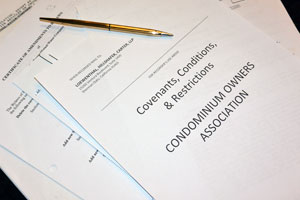| LHC Newsletter Vol. 12, No. 3
Contact us Toll-Free: 1-866-474-5529 (info@lhclawyers.net) By: Robert D. Hillshafer, Esq. David A. Loewenthal, Esq. Barbara A. Higgins, Esq.
|
NEW CASE LAW – 2021
Published Decisions:
Brown v. Montage at Mission Hills, Inc.
[Certified for Publication: Case Nos. E074341, E075762]
Filed August 20, 2021. Court of Appeals of California, Fourth District, Division Two.
Significance: Short term rentals will not be prohibited if there was no prohibition or restriction in place before homeowner(s) purchased their properties. Enforceability will depend on the language of the rental restriction provision and the date it was adopted. This case shows the Court’s (and Legislature’s) desire to protect short-term rental owners who took title before rental restrictions were adopted.
Facts: Brown bought a condominium for investment purposes, which she consistently rented for short terms. Sixteen years after her purchase, the Association amended its governing documents to prohibit renting properties for less than 30 days. When Brown purchased her property, Montage’s governing documents did not prohibit any form of renting, short-term or otherwise. Brown sued the Association, seeking declaratory relief, among other claims, asserting that she was exempt from the prohibition against short term rentals (“STDs”) under Civil Code Section 4740. She also filed a motion for summary adjudication of her declaratory relief claim, requesting that the trial court declare her exempt from the prohibition. The Association, in response, filed a motion for summary judgment, arguing that Brown’s claims failed because (1) Section 4740 precludes the Association from imposing a complete ban on renting which it did not do with Brown (only on her STRs), and (2) Brown’s use of her property for STRs violated the governing documents’ prohibition on using property for commercial purposes. The trial court granted the Association’s motion for summary judgment.
Disposition: The Court of Appeal reversed the summary judgment and agreed with the homeowner, Brown, ruling in favor of her motion for summary adjudication.
Key Findings: The Court opined that Brown was exempt from the prohibition pursuant to Civil Code Section 4740, subdivision (a). That provision provides that an owner of a property in a common interest development shall not be subject to a provision in a governing document or an amendment to a governing document that prohibits the rental or leasing of the owner’s property unless that document or amendment was effective prior to the date the owner acquired title to the property. The Court looked at the legislative history behind Section 4740 and found that the demonstrated goal of the statute was to exempt any kind of rental prohibition or restriction which did not exist when the homeowner acquired title to the property. The Court also noted that the use of the property for STRs was no more of a business use than a long term rental would be.
C.L. v. Del Amo Hospital, Inc. (9th Cir.) 8:18-CV-00475-DOC (DFMX) (C.D. Cal. 10/21/21)
Significance: Service dogs cannot be required to have a certification.
Facts: Plaintiff C.L., who was diagnosed with post-traumatic stress disorder and other conditions, obtained a dog named Aspen, intending it to be her service dog. Because enrolling in a full training course to provide Aspen with formal certification was not a viable option for C.L., she began self-training the dog. C.L. then sought inpatient treatment at Del Amo Hospital’s National Treatment Center. Del Amo denied the dog admission when C.L. asked the hospital to classify Aspen as her service dog, so she could bring the dog with her. The district court entered judgment in favor of Del Amo on the ground that Aspen did not qualify as a service animal under the ADA.
Disposition: The 9th Circuit panel held that the district court erred as a matter of law by effectively imposing a certification requirement for C.L.’s dog to be qualified as a service animal. The panel remanded for the district court to consider whether C.L.’s testimony regarding her self-training of Aspen, coupled with expert testimony, was sufficient to show that Aspen was more likely than not a qualified service dog at the time of trial.
Key Findings: The ADA prohibits certification requirements for qualifying service dogs for three reasons: (1) the ADA defines a service dog functionally, without reference to specific training requirements; (2) Department of Justice regulations, rulemaking commentary, and guidance have consistently rejected a formal certification requirement; and (3) allowing a person with a disability to self-train a service animal furthers the stated goals of the ADA, for other training could be prohibitively expensive.
Issakhani v. Shadow Glen Homeowners Association, Inc. (2021) 63 Cal.App.5th 917
Significance: An Association is not liable for a lack of visitor parking (or injuries sustained outside its property) when a pedestrian is struck by a car while crossing the street trying to reach the Association property and complex.
Facts: A pedestrian who decided to jaywalk across a five-lane highway at night was struck by a car. The pedestrian sued the condominium Association for negligence and premises liability for having too few onsite parking spaces for guests. Her claims were based on the premise that the Association’s failure to maintain the number of guest parking spaces mandated by ordinance No. 151,411 “created a foreseeable risk of harm for the Condominium’s guests.”
Disposition: The Court granted summary judgment in favor of the Association.
Key Findings: It concluded that a landowner’s common law duty of care does not encompass a duty to provide onsite parking for invitees to protect them from traffic accidents occurring off site as they travel to the premises. Nothing in the ordinance or its legislative history showed any intent to protect invitees from traffic accidents that occur when they park off site. The guest parking condition of the applicable ordinance was aimed at preserving the aesthetic character of the surrounding neighborhood, and not at protecting invitees from traffic accidents.
Kracke v. City of Santa Barbara (2021) 63 Cal.App.5th 1089
Significance: The Kracke ruling means that enforcement actions against illegal Short-Term Vacation Rentals (“STVRs”) in the coastal zone will be limited to situations where complaints are received due to tenant behavior, or other nuisance-like conditions. The City will not “proactively” initiate vacation rental-related enforcement actions against unlawful STVRs in the coastal zone, except with respect to business licensing and transient occupancy tax collections. In addition, the City will take enforcement action against any property-related health and safety violation in the coastal zone, whether or not the property is a STVR.
Facts: Manager of STVRs filed a petition for writ of mandate commanding the City to allow short-term rentals in a coastal zone as it had done before instituting a new policy that banned such rentals in the coastal zone.
Disposition: The Court of Appeal held that the city’s ban on STVRs in the coastal zone constituted a “development” under the Coastal Act that required a coastal development permit or an amendment to its certified local coastal program. The Superior Court’s ruling was affirmed.
Key Findings: The City lacked authority to unilaterally ban STVRs in a coastal zone without Commission approval or input. As for the City’s argument that the Coastal Act exempts abatement of nuisances allegedly caused by STVRs, the City waived that issue by informing the trial court it was not “making the nuisance argument. The decision whether to ban or regulate STVRs in the coastal zone is a matter for the City and the Commission to decide.
Smart Corner Owner Association v. CJUF Smart Corner (2021) 64 Cal.App.5th 439
Significance: This case signifies judicial approval of the Association’s members’ right and ability to vote to consent (or ratify) a lawsuit against a developer for construction defects after the filing of a Complaint, as a matter of public policy. A post-trial appeal can extend a “final judicial decision on the merits”.
Facts: An Association filed a construction defect action against the developers of a residential condominium tower. The trial court granted the developers’ motion for summary judgment disposing of the matter on the ground that the Association failed to obtain the consent of more than 50 percent of its condominium owner members before filing the instant action as required by the CC&Rs. By concluding the Association’s complaint was invalid, the court rejected the Association’s argument that a subsequent vote of ratification, held after the filing of the operative complaint, could satisfy the member consent requirement. However, after the Association filed its Notice of Appeal, the Legislature enacted Civil Code Section 5986, effective January 1, 2020, rendering prelitigation member vote requirements in governing documents, null and void. The Association argued that Section 5986 should apply retroactively since its claims had not been resolved through a “final judicial decision on the merits” and further argued that the prelitigation vote requirement violated state public policy.
Disposition: The judgment was reversed and the matter was sent back to the trial court with an instruction to deny the motion for summary judgment. The Association was also deemed entitled to its costs on appeal.
Key Findings: The Court of Appeal held that Section 5986 applied retroactively since that statute allowed for that if there was not an executed settlement, a final arbitration decision, or a “final judicial decision on the merits”. The Court concluded that a pending appeal meant that there had not yet been a “final judicial decision on the merits”. Significantly, the Court also reversed the trial court because it found the prelitigation vote requirement at issue violated fundamental state policy by making it more difficult for the Association to hold developers accountable for construction defects. The Court also found the prelitigation provision to be unreasonable, unconscionable, and violative of the fundamental policy insofar as it required strict compliance as a precondition to suit and prohibited members from providing their consent later through a vote ratifying a board decision to file suit.
****
2020 Unpublished Decisions of Educational/Informative Value:
The following cases are not binding, legal precedent, but give the reader some idea of how a Court might rule under the same or similar circumstances. The cases are not officially published decisions, so cannot be cited in court documents.
Clayton v. Bigelo (Case No.: 21cv285-GPC(BLM) (S.D. Cal. Mar. 24, 2021)
Clayton sued Bigelo, LLC to prevent it from constructing a two-story home that he claimed violated the CCRs, interfered with his ocean view and his right of privacy, and limited his access to light and air because of the size and height of the home. The focus of the lawsuit was on a provision within the governing CCRs that required approval from an architectural committee prior to constructing a home. Normally, no homes were permitted to have more than one story without the prior approval of the committee. Clayton requested mediation, as required before commencing litigation, but Bigelo refused and continued construction after obtaining a two-story permit from the City of San Diego. Clayton then filed a request for a temporary restraining order (TRO) to halt all further construction until a trial could decide the issue.
The Community never had an architectural committee, so it would have been impossible for Bigelo to get approval to build in the first place or obtain permission for a two-story home. The CCRs provided that if there was no architectural committee, then approval would not be required if the dwelling conforms to and is in harmony with similar structures. Nine other homes in the community had two stories.
The Court concluded that the CCRs did not absolutely limit the erection of buildings to a single story, and when no committee was appointed, approval was not necessary as long as the structure was in harmony with other homes. The Court found that the home was in harmony and therefore denied the TRO which effectively ended the case. The Court also ruled that the law does not protect views or rights to privacy in the absence of a specific provisions in the CCRs, and that there is no automatic right to a view and privacy. It also noted that a property owner may not prohibit an adjacent owner from limiting his access to light and air, for example with tall trees, fences or an adjoining structure, without such rights being specified in the CCRs.
Friedel v. Sun Communities, Inc. v. Park Place Community L.L.C., No. 20-12275 (11th Cir. August 24, 2021)
George Friedel, who resided in a mobile home park, suffered from “several chronic physical and mental impairments” and major depressive disorder. The Friedels claimed that because his “disabilities substantially limit one or more of his major life activities,” he has a “handicap” under the Federal Housing Administration (“FHA”). Maggie was an 11-year-old golden retriever serving as George’s emotional support animal and living with the Friedels in Park Place. Maggie bit a dog living in Park Place. After the attack — which was not the first time Maggie displayed aggressive behavior or injured another dog in the community — Park Place issued a notice of violation to the Friedels, notifying them that Maggie had to be removed from the community. The Friedels initially complied, but then secretly brought Maggie back to live with them when George’s condition worsened, and he became more depressed. The Association moved to evict the Friedels. Friedel argued that the Association was obligated under the Federal Fair Housing Act to allow him to keep the dog as an emotional support animal. The Court disagreed, concluding that the risk to the community outweighed his claim for reasonable accommodation, stating that “no reasonable accommodation would have eliminated or acceptably minimized the risk Maggie posed to other residents.”
Sunset Greens Homeowners Association v. Spagenski
[Filed 8/13/2021. Case No. D078201 in San Diego Superior Court. 2021WL 3575130]
Court of Appeal, Fourth District, Division 1.
Summary: Homeowner’s dog attacked residents and their dogs on multiple occasions. “The trial court granted the Association’s motion for summary judgment after determining: (1) the Association established that the Homeowners breached the CC&R’s; (2) the undisputed evidence demonstrated an aggressive dog within the Community creates a condition interfering with the comfortable enjoyment of life or property and violations of the applicable CC&R’s automatically established the existence of a nuisance; and (3) the CC&R’s vested the Board with the discretion to enforce the CC&R’s, to declare Kato a nuisance, and to require Kato’s removal from the Community. The court entered judgment for the Association and permanently enjoined Kato from living in the Community.”
The Homeowners contend summary judgment was not proper because there were triable issues of material fact regarding whether Kato was an aggressive dog and whether his training had eliminated the alleged aggressive tendencies so that he should be allowed to remain within the Community. The Court of Appeal affirmed the granting of a summary judgment because the Association established by undisputed material facts that the Homeowners violated the CC&R’s, the violations constituted a nuisance, and the Association was entitled to a permanent injunction.
The Court reasoned: “The Board can address the problem by removing Kato, or address the problem by trusting [Homeowners] will not let Kato’s aggressive behavior reoccur through continued training. The Board chose the former: Kato’s removal. It is undisputed that this decision was made in good faith and in accordance with the CC&R’s. The Board is vested with discretion, and the Court cannot override this discretion and second guess this decision.”
Lastovich v. Nob Hill Homeowners Association
[Filed December 2, 2020. San Diego. Case No. D075466. 2020 WL 7051439]
Court of Appeal, Fourth District, Division 1, California.
Summary: The Court of Appeal held that short-term rentals did not constitute a business use in violation of a residential use restriction, absent an express prohibition in a declaration. Restrictions on the use of land will not be inferred or read into the CC&Rs without an expression of an intent to limit the land’s use. More specifically, the Court stated: “In sum, based on the rules of construction we must apply to Lastavich’s interpretation of the CC&Rs, including strictly construing them against him in favor of the free use of property; the lack of any express, unambiguous prohibition in the CC&Rs of the use of the Nob Hill units as STVRs, despite references in various sections to nonowners such as renters, occupants, and guests; the undisputed evidence provided by (i) Sandra regarding her intent as a Declarant under the CC&Rs not to limit the rental of units to a minimum stay or to preclude STVRs, and (ii) present and former owners regarding their use of the Nob Hill units as STVRs since about 2005, all of which was known to Lastavich; we independently conclude the CC&Rs do not expressly or by implication prohibit the use of the Nob Hill units as STVRs.”
Dickson v. Century Park East – 2021 WL 3161179 – Signed Order: 5/13/21
[Filed Order re Motions for Summary Judgment in U.S. District Court, C.D. California]
The Court granted the Association’s Motions for Summary Judgment filed on its behalf and that of its legal counsel. After a homeowner became delinquent in payment of a special assessment, the Association and its legal counsel filed a lawsuit seeking its collection. The homeowner filed suit in federal court, arguing that the Association and its legal counsel violated California’s Rosenthal Fair Debt Collection Practices Act and the Federal Fair Debt Collections Practices Act. In ruling in favor of the Association and its legal counsel, the Court determined the special (and general) assessments are not a loan or credit to members of the Association, such as Plaintiff, and concluded it was not a “consumer credit transaction”. Moreover, the law firm’s lawyers were not deemed to be “debt collectors” because Plaintiff failed to prove that the firm regularly collected or attempted to collect debts.


